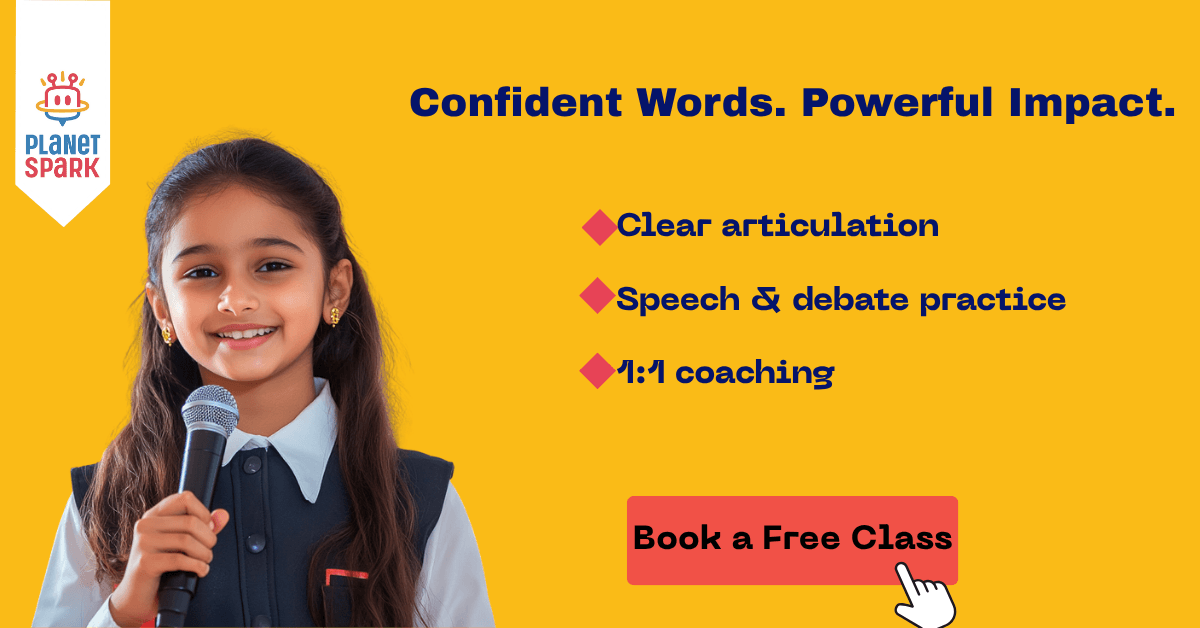9 Effective Ways to Teach Productivity Skills to Your Child

Table of Contents
- 1. Teach Them How to Set SMART Goals
- 2. Encourage the Use of Daily Planners
- 3. Break Big Tasks into Smaller Chunks
- 4. Minimize Distractions with Focus Time
- 5. Promote Active Reading and Listening
- 6. Build Their Verbal Communication Skills
- 7. Teach Them to Manage Emotions and Frustration
- 8. Give Them Responsibility Through Chores
- 9. Celebrate Small Wins (Not Just Big Results)
- The Long-Term Benefits of Teaching Productivity Skills Early
- Be a Role Model for Productivity
- Consistency and Patience
- How PlanetSpark Supports Productivity Skills in Children
- Conclusion
- FAQs
In a world filled with distractions, helping your child build productivity skills isn’t just helpful- it’s essential. Teaching kids how to manage their time, stay focused, set goals, and organize tasks builds the foundation for long-term academic success, emotional stability, and future career growth.
But how do you teach such complex life skills to a 7- or 12-year-old?
That’s where this blog comes in. Here are 9 proven, practical, and age-appropriate ways to help your child develop productivity skills- without burning them out or making them feel pressured.
1. Teach Them How to Set SMART Goals
Children often say things like “I want to do better in school” or “I’ll finish my homework faster.” Help them turn vague ideas into SMART goals:
Specific
Measurable
Achievable
Realistic
Time-bound
Example:
Instead of “I’ll read more,” say:
“I’ll read 10 pages of my storybook every night before bed for a week.”
SMART goals help kids focus their energy and build confidence with every milestone achieved.
2. Encourage the Use of Daily Planners
Kids are visual learners. Using a daily planner or to-do list not only improves task tracking but also gives a dopamine boost when tasks are checked off.
Start with fun, colorful planners or simple printable templates. Encourage your child to list:
Homework
Chores
Reading time
Screen time
Fun or break time
Over time, they’ll naturally learn how to prioritize tasks and avoid last-minute chaos.
Want your child to manage time and express clearly? PlanetSpark’s Public Speaking Program teaches goal setting through structured speech modules
3. Break Big Tasks into Smaller Chunks
One of the biggest productivity blockers for kids? Overwhelm.
Teach your child to break down big projects into smaller, manageable parts.
Instead of “Finish science project,” break it down into:
Research topic
Write introduction
Create visuals
Practice explanation
This teaches them task sequencing- a vital executive functioning skill that improves both academic and life performance.
4. Minimize Distractions with Focus Time
Help kids recognize their productivity killers: TV, phone, gaming, loud surroundings, or even hunger.
Introduce the Pomodoro Technique:
25 minutes of focused work
5-minute break
Repeat 4 times, then take a longer 15–30 min break
This technique boosts concentration and prevents burnout - great for children with shorter attention spans.

5. Promote Active Reading and Listening
Productivity isn’t just about time - it’s about absorbing more in less time.
Teach your child to highlight key words while reading.
Encourage note-making or drawing mind maps.
Ask them to repeat what they’ve learned aloud.
This improves memory retention and speeds up learning - especially helpful during homework or test prep.
Want your child to become a better listener and speaker?
Join PlanetSpark’s Listening and Public Speaking Bootcamp
6. Build Their Verbal Communication Skills
Many children struggle with productivity because they can’t explain what they need, or hesitate to ask questions in class.
Teaching children to communicate clearly - especially when they’re stuck - helps:
Save time on problem-solving
Improve collaboration with peers
Reduce confusion and frustration
Public speaking is not just about being on stage. It’s about knowing what to say, when to say it, and how - whether in group work, homework discussions, or presentations.
PlanetSpark helps shy and expressive children alike speak with structure and confidence
7. Teach Them to Manage Emotions and Frustration
A productive child is not one who never struggles, but one who knows how to bounce back from frustration.
Help your child:
Recognize when they’re overwhelmed
Take a break or deep breaths
Ask for help or reframe their thoughts
You can model this by speaking out loud:
“I’m feeling stuck. I’ll take 5 minutes to walk and then try again.”
Productivity is emotional regulation in action.
8. Give Them Responsibility Through Chores
Assigning age-appropriate chores teaches:
Planning (e.g., what to do first)
Time estimation
Accountability
Let them:
Pack their school bag
Set the dinner table
Water plants every alternate day
These small tasks build discipline and self-worth, which translate into productive behaviors in schoolwork and beyond.
9. Celebrate Small Wins (Not Just Big Results)
Don’t just praise the outcome - praise the effort.
Instead of saying “You got an A!” say:
“You planned your work so well this week!”
“You stayed focused and it paid off!”
“I love how you managed your reading and math time.”
Celebrating consistency rather than perfection fosters a growth mindset, which is the true engine of productivity.
The Long-Term Benefits of Teaching Productivity Skills Early
Teaching productivity to children isn’t just about helping them manage homework or clean their rooms. It’s about shaping their mindset, habits, and problem-solving abilities for life.
When your child learns how to plan, organize, and complete tasks effectively, they:
Become more independent in their studies
Gain confidence in managing challenges
Develop a growth mindset and resilience
Perform better in both academic and extracurricular areas
More importantly, they begin to enjoy the satisfaction that comes from completing tasks and reaching their goals. This emotional payoff encourages intrinsic motivation — where they want to be productive, not just because they’re told to, but because it feels good.
That’s the goal: turning productivity into a habit, not a chore.
Be a Role Model for Productivity
One of the most powerful ways to teach your child productivity is to model it yourself. Children absorb behaviors more than instructions.
Here’s how you can lead by example:
Use a planner or whiteboard at home to map your schedule
Talk through your goal-setting process with them
Show how you handle distractions (“I’ll reply to this message after I finish reading”)
Let them see you take breaks and return refreshed
When they see you juggling priorities, staying calm under pressure, and reflecting on how to improve, they learn that productivity isn’t perfection, but a process.

Consistency and Patience
As with any life skill, the key to building productivity in children lies in consistency and patience.
It’s important to understand that productivity habits won’t form overnight. Children may forget to use their planners, skip routines, or get distracted - and that’s okay. The goal isn’t perfection; it’s progress.
Encourage small wins every day:
Praise them for making their to-do list
Celebrate when they finish homework ahead of time
Help them reflect on what went well and what didn’t
Over time, these micro-moments lead to macro results - strong habits, better time management, and higher self-esteem.
And you don’t have to do it alone. Tools like PlanetSpark’s Public Speaking and Communication Skills Program create a consistent environment where these behaviors are nurtured and reinforced week after week.
Book a free trial class today.
How PlanetSpark Supports Productivity Skills in Children
PlanetSpark’s courses go beyond communication - they actively embed productivity tools into every session.
Here’s how:
Time-bound Speaking Assignments: Children learn to plan and deliver ideas within a fixed time—building focus and clarity.
Feedback Loops: Each class offers real-time feedback, encouraging children to reflect, adjust, and improve (a key aspect of self-management).
Goal Setting: Teachers help students create weekly speaking and writing goals, tracking performance and building consistency.
Responsibility Culture: Kids manage their own class participation, homework, and speaking practice schedules - cultivating accountability.
Conclusion
Some kids are naturally more focused than others. But productivity is not something you’re born with - it’s something you can learn.
With patience, structure, and the right kind of encouragement, your child can grow into a self-driven, confident, and organized individual.
And if you want expert help with that journey…
PlanetSpark’s courses go beyond grammar and reading - they teach life skills like goal setting, public speaking, and focused communication.
Book a FREE class now to help your child unlock their potential
FAQs
1. At what age should I start teaching productivity skills to my child?
Ans. You can begin as early as age 5 with basic habits like planning a routine or managing toys. As children grow, you can introduce goal setting, scheduling, and communication tools.
2. My child is very distracted. Can productivity be taught?
Ans. Yes! With consistency and support, even easily distracted children can develop routines, manage their time, and reduce procrastination. Tools like planners, reward systems, and guided routines help.
3. How can PlanetSpark help improve my child’s productivity?
Ans. PlanetSpark enhances focus, time management, and structure through public speaking, communication drills, goal-setting activities, and personalized mentorship.
4. What if my child is shy and avoids responsibility?
Ans. PlanetSpark is especially helpful for shy or hesitant learners. It nurtures confidence through personalized attention and builds responsibility through consistent progress feedback and speaking tasks.
5. Are these productivity skills useful beyond school?
Ans. Absolutely. These skills improve your child’s ability to manage time, collaborate, lead, and handle stress- making them better prepared for adulthood, work, and relationships.
Personalized Communication Report
Record a video to get a AI generated personalized communication report for your child

Hi There, want to try these
tips for your child with
LIVE with our expert coach?
Let's check your child's
English fluency
